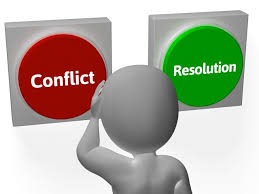Conflict Resolution
“Whenever you’re in conflict with someone, there is one factor that can make the difference between damaging your relationship and deepening it. That factor is attitude.” — William James
When you’re in conflict with another person, you both are usually aware of it at some level. There’s a sense of disruption, unease, something is not right. The communication between you might change, perhaps becoming superficial. Or there’s silence.
Conflicts between people are a normal, natural and inevitable part of life–at work, at home and in all our relationships with others. Unfortunately, most of us don’t really accept this fact and we still get surprised and distressed when it’s clear that a conflict has emerged.
As long as everything is going along smoothly, it’s easy to be considerate and respectful of another person’s needs. But the emergence of a conflict can change all that–now we can feel threatened, anxious and angry. The same person whom we enjoyed yesterday now seems like an adversary. That’s because of our vast, past experience with conflict, most of which was negative.
We have a negative attitude toward conflict because we haven’t learned constructive ways to deal with it.
A great deal of research shows the damaging effects that conflicts have on interpersonal relationships. It creates distance, separation, dislike, even hatred. It’s the main reason people leave their jobs for new ones and marriages break up.
Examples:
Values Conflict
Some people may value hard work above all else, while another person thinks it's wrong to waste your life on backbreaking labor.
Resources Conflicts
This is when two people fight over money.
Ego Conflicts
Sometimes people come into conflict because they are jockeying for position.
History Conflicts
When misdeeds between two individuals build up over time, and people eventually become bitter. These pent up feelings can erupt and lead to conflict.
Personality Conflicts
There are cases where two people have totally incompatible personalities, and they will find each other difficult to tolerate.
The importance of listening with empathy to the other person’s needs, feelings and beliefs cannot be overstated. Something amazing happens when people feel understood and accepted. Their strong emotional feelings subside.
Forgive.
Nelson Mandela said, “Resentment is like drinking poison and then hoping it will kill your enemies.” Recognize that people come into our lives for a reason and even negative experiences are opportunities for growth. Be grateful for the learning experience, work towards acceptance, forgive and let go of the past.




Comments
Post a Comment